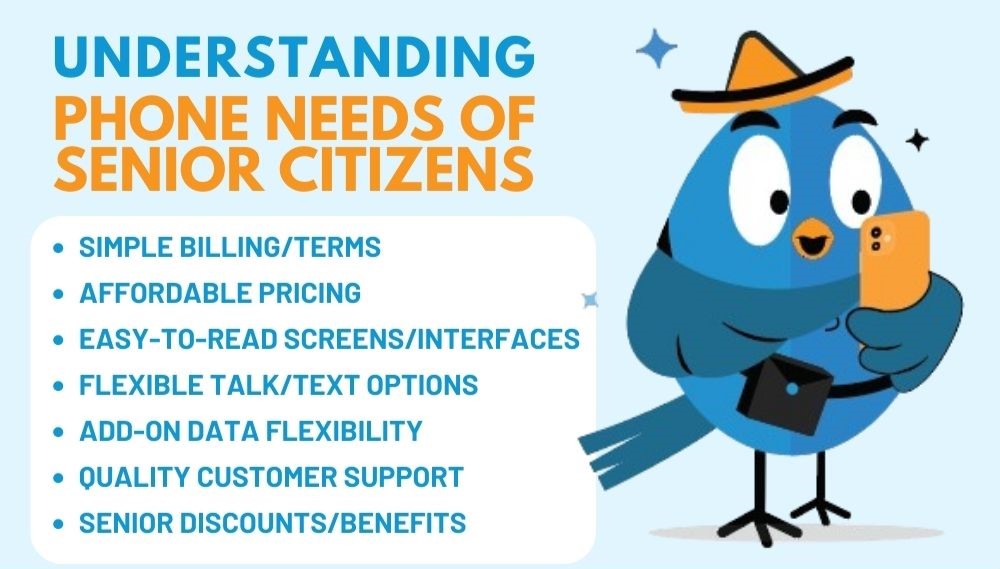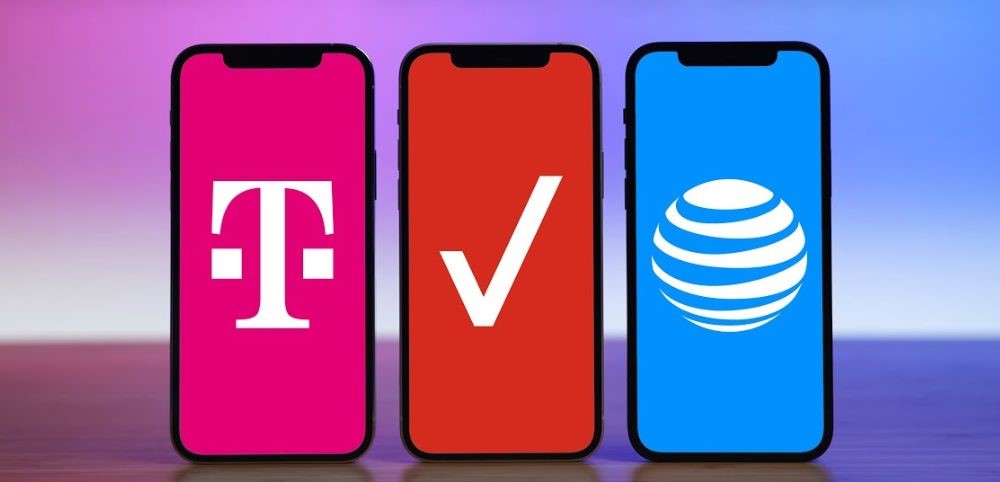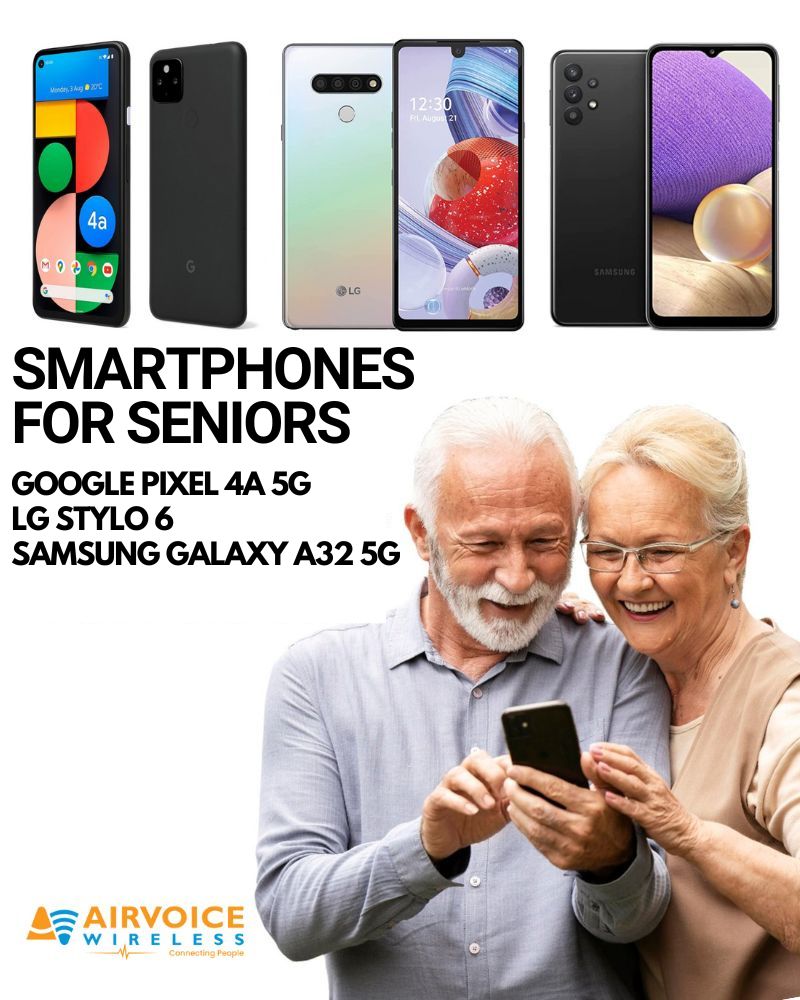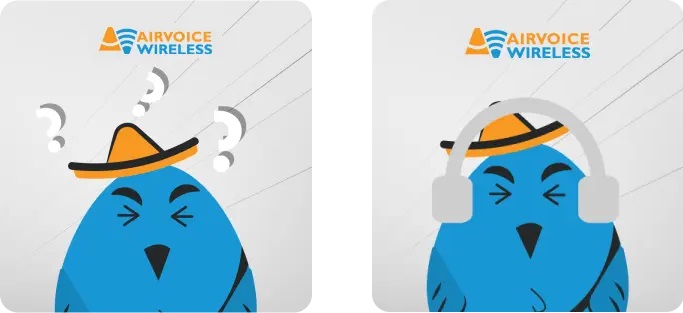55 and Over: Top Cell Phone Plans for Seniors – AirVoice Wireless

Introduction to Senior Cell Phone Plans
Importance of Cell Phone Plans for Seniors
For seniors, cell phones are more than a technological convenience; they’re a lifeline to the wider world. Cell phones, whether iPhone or Android, are essential for seniors, providing safety in emergencies and facilitating connections with loved ones. They help manage health, provide entertainment, and simplify daily tasks like banking and shopping. Choosing the right cell phone plan is crucial for seniors’ quality of life.
Why Are Cellphones Important to Seniors?
- Safety and Emergency Assistance: Cell phones provide seniors with a means to call for help in case of emergencies, whether they’re at home or on the go. Having immediate access to emergency service hotlines, family members, or caregivers can be lifesaving in critical situations.
- Communication with Family and Friends: Cell phones allow seniors to stay in touch with their loved ones, regardless of distance. Whether it’s a quick check-in, a heartfelt conversation, or sharing important updates, cell phones facilitate ongoing communication, helping seniors feel connected and supported.
- Access to Health Resources: Many seniors rely on their cell phones to manage their health, whether it’s setting medication reminders, accessing health-related apps, or contacting healthcare providers. Cell phones can also provide access to premium telemedicine services, allowing seniors to consult with doctors remotely.
- Transportation and Navigation: Cell phones equipped with GPS functionality can help seniors navigate unfamiliar places, ensuring they can travel safely and independently. This feature is particularly valuable for seniors who may no longer drive or who have mobility challenges.
- Entertainment and Mental Stimulation: Cell phones offer a wide range of entertainment, from listening to music and audiobooks to playing games and watching videos on Netflix. Engaging in these activities matters to seniors as they provide mental stimulation, entertainment, and opportunities for relaxation.
- Access to Information and Services: With the internet at their fingertips, seniors can easily access information on a variety of topics, such as news, weather updates, and local events. They can also use their cell phones to shop online, manage finances, streaming subscriptions, and access government services.
Understanding the Unique Needs of Seniors
As we consider the unique needs when selecting a cell phone plan for seniors , it becomes apparent that one size does not fit all. The way seniors interact with technology can significantly differ based on various factors, like their lifestyle, tech-savviness, and the degree of connectivity they require. Phone plans tailored for seniors should prioritize simplicity, affordability, and accessibility. These plans should offer easy-to-understand billing structures without hidden fees or complex terms. Features such as large, easy-to-read screens and simplified interfaces cater to seniors’ needs. Additionally, plans should include options for limited or unlimited talk and text, with the flexibility to add data if needed to avoid overages. Providing excellent customer support and offering discounts or special benefits for seniors can also enhance the appeal of these plans. These criteria should be taken into consideration to satisfy the needs of the seniors:
- Simplicity in billing and terms
- Affordable pricing structures
- Large, easy-to-read screens and simplified interfaces
- Options for limited or unlimited talk and text
- Flexibility to add data as needed
- Excellent customer support
- Discounts or special benefits for seniors

Exploring the Benefits of Medicare Cell Phones for Seniors.
The intersection of health care resources like Medicare and cellular technology has a unique potential to impact seniors’ access to communication and support. A relatively overlooked area is that of Medicare-related cell phone benefits, more than just discounts; they include health-focused apps and services, enhancing communication and support. Some Medicare Advantage plans provide reduced-cost or free cell phone services, improving access to healthcare professionals via telemedicine. These phones often feature health apps for monitoring conditions and medication reminders. Beyond financial savings, Medicare cell phones promote overall well-being, keeping seniors connected to vital resources for a healthier, more secure life. Seniors and their families should explore eligibility for these benefits when considering Medicare plans. To access Medicare cell phone plan for senior discounts, seniors should start by confirming whether their Medicare Advantage plan provides such perks. Once suitable options are identified, seniors can enroll and ensure eligibility by submitting the required documents, this helps Medicare identify your authenticity and avoid fraudulent behavior. This step is crucial for verifying qualification and accessing any additional benefits included in the chosen plan.

How to Select the Right Plan for You
Factors to Consider for Senior Mobile Users
When it comes to mobile users, selecting the right cell phone plan for seniors is crucial for a supportive, stress-free experience. Here are some tailor-made factors that one should consider:
- User Experience: For older adults who may not be as familiar with the latest gadgets, the ease of use is paramount. Look for plans that offer simple, intuitive phones with large buttons, clear screens, and simplified menus.
- Health and Safety Features: Plans that provide health-related services, like medical alert systems or GPS tracking for those with cognitive impairments, add an extra layer of security and peace of mind for both seniors and their caregivers.T
- Customer Service: Easy access to responsive and patient customer support is crucial, especially if the senior is less technologically inclined. Seek out carriers known for their excellent customer service, including extended hours for help and support via phone, chat, or in-person.
- Network Coverage: Good reception and a reliable network can be especially important in emergencies. It’s necessary to choose a provider with strong coverage in the user’s local area and destinations they frequently visit.
- Affordability: Cost-effective plans that fit within a fixed income are essential for many seniors. This includes low-cost plans, no-contract options, and freedom from hidden fees.
- Flexibility: Plans allowing the user to adjust services as their needs change without penalties help maintain control over their monthly expenses.
- Compatibility with Assistive Devices: For those who use hearing aids or other assistive devices, ensuring that the phone and the plan support this technology is essential.
By keeping these factors at the forefront of your choices, you will find a cell phone plan that not only fits your needs but also enhances your daily life without causing undue burden or complication.
The Best Deals in 2024
Senior Discounts on Major Carriers
When choosing a cellphone plan for seniors, it’s essential to consider factors such as coverage, customer service quality, and additional features like health and safety services. Comparing plans and assessing individual needs can help seniors find the best option for their specific requirements and budget. The best cellphone plans for seniors typically offer simplicity, affordability, and features tailored to their needs. Here are some top options from major networks AT&T, T-Mobile, and Verizon:
- Senior-focused: Tailored for individuals aged 65 and older.
- Basic phone option: Offers limited minutes on basic phones.
- Discounted rate: Provides affordability through reduced pricing.
- Voice-centric: Emphasizes voice calls over other features.
- Simplified structure: Streamlines the plan for easy understanding.
- Affordable accessibility: Ensures affordability for seniors on fixed incomes.
- Voice priority: Prioritizes voice communication over data and texting.
- Reliable coverage: Offers dependable service through AT&T’s network.
T-Mobile Magenta Unlimited 55+:
- Age-specific plan: Available exclusively for customers aged 55 and older.
- Unlimited everything: Provides unlimited talk, text, and data.
- Discounted rate: Offers reduced pricing compared to standard plans.
- Senior-friendly: Tailored for seniors who use their phones frequently.
- Comprehensive coverage: Ensures connectivity across all communication channels.
- Affordable access: Provides cost-effective options for older adults.
-
- Age-specific offering: Exclusive to customers aged 55 and older.
- Unlimited communication: Includes unlimited talk, text, and data.
- Discounted rate: Offers reduced pricing compared to standard plans.
- Additional perks: Provides extras like mobile hotspot usage.
- International calling: Includes options for making calls abroad.
- Comprehensive coverage: Verizon’s network ensures connectivity across all channels.
- Cost-effective: Provides affordability for older adults.

Comparing Discounts and Deals for 55+
Consumer Cellular:
- Straightforward Plans: As an MVNO, Consumer Cellular provides straightforward plans with no contracts and no hidden fees, offering simplicity and transparency for families.
- Flexibility: With options for talk, text, and data allowances, Consumer Cellular’s plans cater to a range of usage needs, ensuring that families can choose a plan that suits them best.
- Discounts for AARP Members: Consumer Cellular offers discounts for American Association of Retired Persons (AARP) members, an interest group in the United States focusing on issues affecting those over the age of fifty members.
- Family Plan Features: Consumer Cellular’s family plans include shared data and customizable options for each line, allowing families to manage their usage and expenses efficiently.

AirVoice Wireless:
- Affordability: AirVoice Wireless offers prepaid plans with competitive pricing and no contracts, making it budget-friendly for seniors.
- Customization: With various plans offering options for talk, text, and data allowances, seniors in a family plan can choose options that aligns with their specific needs and usage patterns.
- International Calling: All AirVoice Wireless plans include unlimited international calling to over 80+ countries, including Mexico and Canada.
- Family Plan Options: AirVoice Wireless provides family plan options with shared data, allowing multiple lines to access the same pool of data. This facilitates cost-effective sharing of resources among family members with senior members.
- Phone Compatibility with Hearing Aids: AirVoice Wireless’ available phones are designed with accessibility and reliability in mind, including compatibility with hearing aid accessories so you can hear every conversation loud and clear.

Best User-Friendly Smartphones for the Elderly

For seniors seeking simplicity and ease of use in their mobile experience, certain cell phones stand out in the market for being particularly user-friendly for the elderly:
- Google Pixel 4a 5G: Offering a clean and intuitive user experience, the Pixel 4a 5G is perfect for seniors. With its simple interface and Google Assistant, tasks like making calls and browsing the web are hassle-free. Plus, its impressive camera allows seniors to capture and share special moments effortlessly.
- LG Stylo 6: Well-suited for seniors who appreciate a larger display and stylus functionality, the Stylo 6 provides easy viewing and precise navigation. Features like customizable interface and long-lasting battery ensure seniors stay connected and productive.
- Samsung Galaxy A32 5G: Combining affordability with user-friendly interface, the Galaxy A32 5G is ideal for seniors. Its large and vibrant display makes reading and viewing comfortable, while long-lasting battery and 5G connectivity keep seniors connected with ease.
Accessibility Features to Look For
When choosing a cell phone plan for a senior, accessibility features for the elderly can immensely improve the device’s usability, making it an enabling rather than a disabling technology. Here are some critical features to look out for:
- Large, Clear Display and Text: A high-contrast, readable display with the option to increase text size is vital for those with vision impairment.
- Voice Commands and Voice-to-Text: These can simplify the use of a device, enabling users to perform functions without having to type or navigate complex menus.
- Hearing Aid Compatibility (HAC): Phones that are compatible with hearing aids reduce feedback and improve audio clarity for those with hearing difficulties.
- Physical Keypad or Touchscreen with Haptic Feedback: The tactile response from a physical keypad or haptic feedback from a touchscreen can assist those who struggle with fine motor skills.
- Emergency Call Buttons and Health Features: Some phones offer dedicated urgent response buttons or built-in health monitoring apps for added safety and health management.
- Adjustable Volume Controls: Users must be able to easily adjust the call volume to a comfortable listening level.
- Easy-to-Navigate User Interface: Simplified interfaces with easily recognizable icons help seniors navigate their phone effortlessly.
- Assistive Access or “Senior Mode”: Features that enhance the phone’s accessibility, such as enlarging icons or simplifying the layout, can make smartphones more elder-friendly.
- Battery Life: A long-lasting battery ensures the phone will work throughout the day without the need for frequent recharging.
By prioritizing these accessibility features, you can ensure that the senior in your life has a phone that not only meets their communication needs but also their functional needs, allowing them to use the technology with confidence and independence.

Making the Switch to a Senior Plan
Steps to Migrate to a New Carrier
By preparing accordingly and approaching the process methodically, you can migrate to your new carrier without unexpected complications, keeping the transition as stress-free as possible. Your upgrade to a new cell phone carrier can be a smooth process if you follow these steps:
- Research Plans: Identify needs and compare carriers with senior discounts or desired features. These can usually be found on carrier’s web pages.
- Verify Coverage: Ensure new provider offers reliable service in your area and frequented locations.
- Understand Terms: Clarify contracts, fees, and policies for current and new plans.
- Prepare Device: Ensure compatibility and unlock if needed.
- Gather Information: Collect account details and personal identification.
- Contact Carrier: Initiate transfer online, by phone, or in-store.
- Port Number: Request transfer, expecting a delay.
- Backup Data: Secure contacts, photos, and apps before switching.
- Activate Service: Follow new carrier’s instructions for activation.
- Confirm Cancellation: Ensure old account is canceled to avoid billing overlap and extra data costs.
FAQs
How can seniors access Medicare cell phone plan discounts?
Seniors can access Medicare cell phone plan discounts by first checking if their Medicare Advantage plan offers such benefits. They can also explore government programs like Lifeline Assistance and research cell phone providers that offer discounts for seniors. After identifying eligible plans, seniors can enroll, verify their eligibility, and utilize additional benefits offered by the chosen plan.
Can I keep my current phone number when switching to a senior cell phone plan?
In most cases, yes. Providers typically allow you to transfer your existing phone number to your new plan. It’s a straightforward process that can usually be done online or over the phone. Contact your new carrier’s customer service to help you port your number.
How can I know if a mobile phone is HAC compliant?
To determine if a mobile phone has the availability of Hearing Aid Compatible (HAC), you can check for a couple of key indicators:
- FCC Rating Label: The Federal Communications Commission (FCC) mandates that HAC phones sold in the United States must be labeled with their M-Rating and T-Rating. These ratings indicate the device’s compatibility with hearing aids in acoustic coupling (M-Rating) and telecoil coupling modes (T-Rating). Look for a user manual or the phone’s packaging for these ratings. Phones with an M-Rating of M3 or M4 and a T-Rating of T3 or T4 are considered to be more likely to work well for hearing aid users.
- Carrier Information: You can also consult with your carrier, as they’re required to offer HAC-compliant phone models and carry detailed information about them.
- Manufacturer Details: Visiting the phone manufacturer’s website or contacting their customer support hotline can provide official specifications about the phone’s HAC compliance.
- Retailer Assistance: When purchasing the phone from vendors, the staff should be able to tell you if a particular model is HAC compliant and help you in locating this information.
It’s important not just to confirm that a phone is HAC compliant but also to test the phone with your hearing aid to ensure it meets your personal needs. Compatibility levels can vary, and what works for one user might not work for another, even if a phone has a high HAC rating. Therefore, taking advantage of any trial periods offered by the retailer or carrier to test the phone with your hearing device is recommended.






